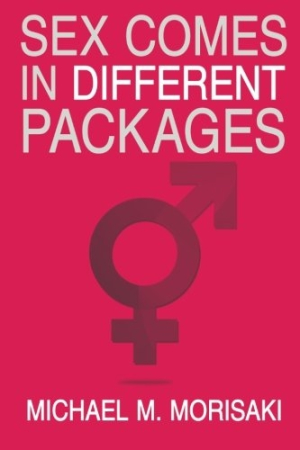Sex Comes in Different Packages
The intriguing premise of this novella traces the process of one transwoman’s understanding of her sexual identity.
Michael M. Morisaki’s novella, Sex Comes in Different Packages, bills itself as the story of one individual’s coming to terms with sexual expression and sexual orientation. As a retired medical professional and previous winner of the James Clavell Literary Award, the author clearly possesses the background to write about the subject with compassion and flair.
The protagonist, born Ray Stevens and later called Reyna Stevens, is properly described as transgender, and as a male-to-female transwoman. The transwoman’s sexual orientation would best be described as bisexual because she finds herself attracted to both men and women. The author’s failure to use appropriate terminology results in a questionable title for the novel, as well as sentences like these: “[Ray] had heard that people in Los Angeles were more tolerant of people’s sexual orientation. He did not want to hurt his [family] by revealing his sexuality, which his parents suspected as being homosexual,” and “Straights who might tolerate homosexuals do not necessarily tolerate transgenders.” Morisaki’s repeated use of homosexual rather than the currently accepted term gay makes the protagonist’s journey seem like a medicalized saga in a mid-twentieth-century physician’s textbook.
While grappling with the book’s confusing and outdated terminology, readers will also remain removed from the protagonist’s plight because of Morisaki’s overreliance on summary, sparing use of interior thoughts, and even more sparing use of either direct or indirect dialogue. In fact, the chapter with the most dialogue centers around the protagonist’s first sexual encounter with a tertiary character named Evelyn.
After much explicit and stilted dialogue leading up to their first bedroom escapade, Morisaki hurriedly summarizes the rest of their relationship: “Ray and Evelyn both got together often. Their friends thought they were going together. Evelyn did find someone who satisfied her physical needs, but they remained close friends. They confided in each other. Evelyn finally got remarried and traveled to east of Las Vegas.” Such quick, simple sentences deprive readers of details that would keep the audience invested in the story, such as what Ray and Evelyn’s pals thought of their relationship, what the couple confided in one another about, and how each felt when Evelyn married again.
When Ray’s conservative parents fly in from Michigan for a visit, the protagonist enlists a married secretary to pose as his girlfriend. Everything, from the approach of the secretary with the idea to the actual meeting itself, is told in a reporter’s style, which distances the audience from the story. What little dialogue and inner thoughts actually do appear are so banal that they reveal none of each character’s individuality.
It would seem that Morisaki also wishes to educate others about the ups and downs of being transgender through the protagonist’s discoveries and struggles with identity. Unfortunately, though, the old-fashioned language and flat characters stop the book from performing as an effective educational tool. The ending blindsides the audience and leaves readers confused as to what happened and why. Morisaki’s potentially poignant and instructive portrait of a transwoman is stymied at both the structural and textual level.
Reviewed by
Jill Allen
Disclosure: This article is not an endorsement, but a review. The publisher of this book provided free copies of the book and paid a small fee to have their book reviewed by a professional reviewer. Foreword Reviews and Clarion Reviews make no guarantee that the publisher will receive a positive review. Foreword Magazine, Inc. is disclosing this in accordance with the Federal Trade Commission’s 16 CFR, Part 255.

